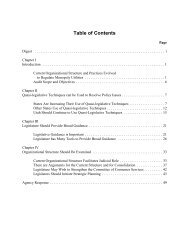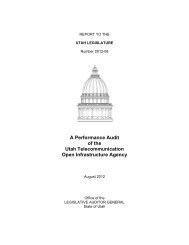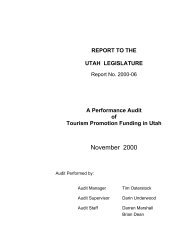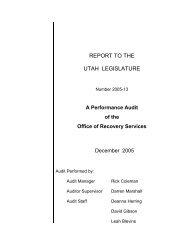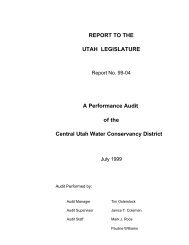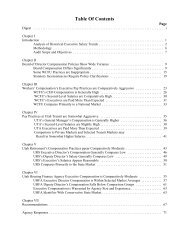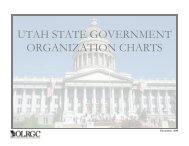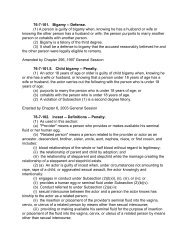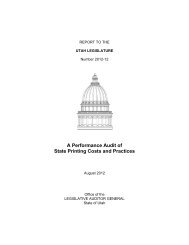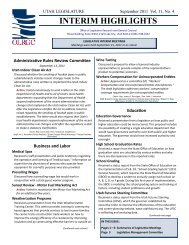A Review of the Judicial Conduct Commission - Utah State Legislature
A Review of the Judicial Conduct Commission - Utah State Legislature
A Review of the Judicial Conduct Commission - Utah State Legislature
You also want an ePaper? Increase the reach of your titles
YUMPU automatically turns print PDFs into web optimized ePapers that Google loves.
to <strong>the</strong> <strong>Utah</strong> Code 78-8-102 and four members <strong>of</strong> <strong>the</strong> <strong>Utah</strong> <strong>State</strong><strong>Legislature</strong> shall be appointed for service on <strong>the</strong> <strong>Judicial</strong> <strong>Conduct</strong><strong>Commission</strong>.<strong>Utah</strong>’s legislativemembership wasupheld by <strong>the</strong>Supreme Court in1999.Legislative involvement has been upheld as constitutional by <strong>the</strong> <strong>Utah</strong>Supreme Court. The JCC has had legislative members on <strong>the</strong> commissionsince 1971, with a six-month removal in 1998-99 while <strong>the</strong> <strong>Utah</strong>Supreme Court decided if legislators could be on <strong>the</strong> commission withoutviolating <strong>the</strong> principle <strong>of</strong> separation <strong>of</strong> powers.Legislator service on <strong>the</strong> <strong>Judicial</strong> <strong>Conduct</strong> <strong>Commission</strong> wasinterrupted for six-months in 1998-99, due to <strong>the</strong> Young Supreme Courtruling resulting from a Separation <strong>of</strong> Powers case. In <strong>the</strong> first Young casefiled July 10, 1998, Judge David Young asserted that <strong>the</strong> <strong>Judicial</strong> <strong>Conduct</strong><strong>Commission</strong> violated <strong>the</strong> Separation <strong>of</strong> Powers provision <strong>of</strong> <strong>the</strong> <strong>Utah</strong>Constitution due to legislative membership on <strong>the</strong> commission. TheCourt agreed with Judge Young and held that <strong>the</strong> “<strong>Commission</strong> asconstituted...violated Article V, section 1 <strong>of</strong> <strong>the</strong> Constitution.” The rulingthus removed legislators from <strong>the</strong> <strong>Judicial</strong> <strong>Conduct</strong> <strong>Commission</strong>.Six months later, <strong>the</strong> Supreme Court reversed <strong>the</strong> previous rulingstating “that legislative membership on <strong>the</strong> <strong>Judicial</strong> <strong>Conduct</strong> <strong>Commission</strong>should be held constitutional.” The Supreme Court, not <strong>the</strong> <strong>Judicial</strong><strong>Conduct</strong> <strong>Commission</strong>, has ultimate decision-making responsibilityconcerning JCC recommendations, and <strong>the</strong> court stated that <strong>the</strong> presence<strong>of</strong> legislators on <strong>the</strong> commission could not violate Article V, section 1 <strong>of</strong><strong>the</strong> Constitution. Historical evidence was presented which clearly provedthat <strong>the</strong> 1984 Constitutional Revision Committee understood <strong>the</strong>separation <strong>of</strong> power issues and established <strong>the</strong> JCC with <strong>the</strong>understanding that legislators would be among <strong>the</strong> members.In <strong>the</strong> Young II case filed January 22, 1999, <strong>the</strong> Supreme Courtvalidated legislative standing on <strong>the</strong> commission stating,...it seems plain that <strong>the</strong> Constitutional Revision <strong>Commission</strong>intended <strong>the</strong> commission [<strong>Judicial</strong> <strong>Conduct</strong> <strong>Commission</strong>] toremain an entity exercising powers available to be shared by o<strong>the</strong>rbranches <strong>of</strong> government. [Fur<strong>the</strong>r,] <strong>the</strong> function performed by <strong>the</strong>commission is not <strong>the</strong> exclusive province <strong>of</strong> <strong>the</strong> judiciary, . . . <strong>the</strong>function exercised by <strong>the</strong> legislators sitting on <strong>the</strong> commission isnot appertaining to <strong>the</strong> judicial branch. [Finally], as we said in reWor<strong>the</strong>n, this court, not <strong>the</strong> [<strong>Judicial</strong> <strong>Conduct</strong>] <strong>Commission</strong>, hasOffice <strong>of</strong> <strong>the</strong> <strong>Utah</strong> Legislative Auditor General – 21 –




